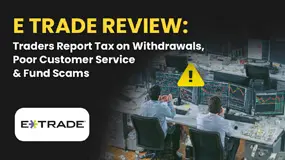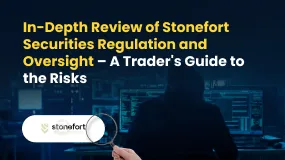简体中文
繁體中文
English
Pусский
日本語
ภาษาไทย
Tiếng Việt
Bahasa Indonesia
Español
हिन्दी
Filippiiniläinen
Français
Deutsch
Português
Türkçe
한국어
العربية
Prop Trading vs. Algo Trading: How They Shape Modern Markets
Abstract: This article will provide an overview of these two strategies, examining what sets them apart and why each has its place in today’s markets.

The financial markets have evolved rapidly with the advancement of technology, bringing in new trading strategies and tools that have changed the way people approach investing. Two prominent strategies that have grown in popularity are prop trading and algo trading. Though they share similarities in using sophisticated analysis and leveraging capital for potential profit, they differ significantly in approach, goals, and tools. This article will provide an overview of these two strategies, examining what sets them apart and why each has its place in todays markets.
What is Prop Trading?
Prop trading (or proprietary trading) refers to when a financial firm or bank trades stocks, bonds, currencies, or other financial instruments with its own capital instead of clients' funds. The primary goal is to generate direct profit for the firm.
Key Characteristics of Prop Trading
Firm's Capital: Firms use their own funds rather than client investments, which can increase the profit potential.
Risk and Reward: Prop trading can yield high returns, but it also comes with a high level of risk since firms are investing their own capital.
Professional Traders: Many firms hire skilled traders with experience in quick decision-making and understanding market conditions.
Benefits of Prop Trading:
High Earning Potential: With access to significant capital, traders can execute larger trades that can yield higher profits.
Access to Resources: Prop traders often have access to advanced trading platforms, data, and tools that arent typically available to retail traders.
Learning Opportunities: Many proprietary trading firms offer mentorship and intensive training, making them great environments for developing professional trading skills.
What is Algo Trading?
Algorithmic trading (or algo trading) uses automated programs to execute trades based on pre-defined criteria, such as timing, price, or market conditions. Algorithms analyze vast amounts of market data and can execute trades at speeds and frequencies that human traders can't match.
Key Characteristics of Algo Trading
Automation: Trades are executed automatically based on coded algorithms, reducing the need for human intervention.
Speed and Precision: Algorithms can instantly react to market changes, executing orders at optimal prices and times.
Quantitative Focus: Many algo traders use quantitative models to analyze historical data, identify patterns, and forecast price movements.
Benefits of Algo Trading:
Efficiency: Automated trading eliminates emotional bias and can optimize trades, allowing for high-frequency strategies that capitalize on small price movements.
Backtesting: Traders can test algorithms on historical data to assess potential performance, refining their strategies before live execution.
Consistency: Algorithms follow predetermined rules, which can lead to a more disciplined approach to trading than manual methods.
Current Trends in Prop and Algo Trading
In recent years, both prop and algo trading have adapted to a rapidly changing market environment:
AI-Driven Algo Trading: Artificial intelligence (AI) and machine learning are enhancing algorithmic models. AI algorithms can adjust strategies dynamically based on evolving market conditions, creating more adaptive trading systems.
Hybrid Models: Some prop trading firms are integrating algorithmic systems, combining the human intuition of experienced traders with the computational power of algorithms to gain a competitive edge.
Rise of Proprietary Algo Trading Firms: Many new firms specialize solely in algo trading, using proprietary algorithms and strategies to compete in the high-speed trading space. This trend is particularly prevalent in cryptocurrency markets, where algo trading has become dominant.
Increased Focus on Regulation and Compliance: Regulatory bodies around the world have increased scrutiny of algorithmic trading, aiming to mitigate risks like flash crashes and unfair market manipulation. Both prop and algo trading firms are investing in compliance to ensure adherence to new regulations.
Which Trading Method is Right for You?
For individual traders, algo trading might be more accessible, given the rise of retail trading platforms that support algorithmic strategies. However, those interested in a more hands-on approach, with the potential to trade larger sums, might find opportunities in prop trading firms if they are prepared to manage the risks involved.
Conclusion
Prop trading and algo trading each offer unique advantages and require different skill sets and resources. Prop trading‘s reliance on human insight and significant capital can lead to high returns, while algo trading’s automation and efficiency provide consistent, disciplined trades. The best choice depends on individual goals, risk tolerance, and the level of resources available. As technology and regulation continue to shape the trading landscape, both methods will remain essential components of the financial ecosystem.

Disclaimer:
The views in this article only represent the author's personal views, and do not constitute investment advice on this platform. This platform does not guarantee the accuracy, completeness and timeliness of the information in the article, and will not be liable for any loss caused by the use of or reliance on the information in the article.
Read more

E TRADE Review: Traders Report Tax on Withdrawals, Poor Customer Service & Fund Scams
Has your E Trade forex trading account been charged a withholding tax fee? Did your account get blocked because of multiple deposits? Did you have to constantly call the officials to unblock your account? Failed to open a premium savings account despite submitting multiple documents? Is fund transfer too much of a hassle at E Trade? Did you find the E Trade customer support service not helpful? In this E Trade review article, we have shared certain complaints. Take a look!

mBank Exposed: Top Reasons Why Customers are Giving Thumbs Down to This Bank
Do you find mBank services too slow or unresponsive? Do you find your account getting blocked? Failing to access your account online due to several systemic glitches? Can’t perform the transactions on the mBank app? Do you also witness inappropriate stop-level trade execution by the financial services provider? You are not alone! Frustrated by these unfortunate circumstances, many of its clients have shared negative mBank reviews online. In this article, we have shared some of the reviews. Read on!

In-Depth Uniglobe Markets Commission Fees and Spreads Analysis – What Traders Should Really Know
For experienced traders, the cost of execution is a critical factor in broker selection. Low spreads, fair commissions, and transparent pricing can be the difference between a profitable and a losing strategy over the long term. This has led many to scrutinize the offerings of brokers like Uniglobe Markets, which presents a tiered account structure promising competitive conditions. However, a professional evaluation demands more than a surface-level look at marketing claims. It requires a deep, data-driven analysis of the real trading costs, set against the backdrop of the broker's operational integrity and safety. This comprehensive Uniglobe Markets commission fees and spreads analysis will deconstruct the broker's pricing model, examining its account types, typical spreads, commission policies, and potential ancillary costs. Using data primarily sourced from the global broker inquiry platform WikiFX, we will provide a clear-eyed view of the Uniglobe Markets spreads commissions prici

In-Depth Review of Stonefort Securities Regulation and Oversight – A Trader's Guide to the Risks
For experienced traders, the process of selecting a new broker transcends a simple comparison of spreads and leverage. It is a meticulous due diligence exercise where the integrity of the broker's regulatory framework is paramount. Stonefort Securities, a relatively new entrant in the crowded brokerage space, presents a complex and often contradictory profile. On one hand, it boasts a modern MT5 platform and a stream of positive user testimonials. On the other hand, it is shadowed by severe regulatory warnings that question the very foundation of its operations. This in-depth review focuses on the core issue for any long-term trader: Stonefort Securities regulation and oversight. We will dissect the broker's corporate structure, scrutinize its licensing claims, and analyze what the data implies for trader protection and fund security. For traders evaluating whether Stonefort Securities is a trustworthy partner, understanding these details is not just important—it is essential.
WikiFX Broker
Latest News
WikiFX's New Evaluation of ATM Capital LTD: Does its License Protect the Arab Investor?
How a Fake Moomoo Ad Led to the “New Dream Voyage 5” Scam
Is Axi Legit? A Data-Driven Analysis of Its Regulatory Standing and Trader Feedback
Trive Investigation: High Score, Hidden Risk - The Profit Paradox
In-Depth Uniglobe Markets Commission Fees and Spreads Analysis – What Traders Should Really Know
FXPesa Review: Are Traders Facing High Slippage, Fund Losses & Withdrawal Denials?
CMC Markets Australia Revenue Surges 34%, But High-Net-Worth Clients Face Tax Phishing Threat
Bessent believes there won't be a recession in 2026 but says some sectors are challenged
Young Singaporean Trader Grew USD 52 into a USD 107,700 Portfolio
Is GGCC Legit? A Data-Driven Analysis for Experienced Traders
Currency Calculator



